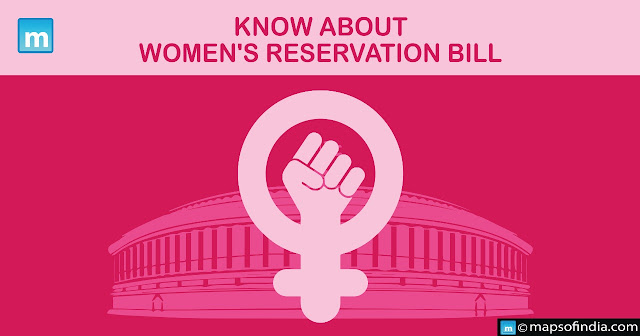- Get link
- X
- Other Apps
On September 20, 2023, the Lok Sabha passed the Women's Reservation Bill, officially known as the Constitution (One Hundred and Twenty-Eighth Amendment) Bill, 2023, with a near-unanimous vote. The bill was passed by the Rajya Sabha on September 22, 2023, and will now be sent to the President for her assent.
The Women's Reservation Bill is a landmark piece of legislation that will reserve one-third of all seats in the Lok Sabha and state legislative assemblies for women. This will be a major step towards ensuring gender equality in Indian politics and society.
History of the Women's Reservation Bill
The Women's Reservation Bill was first introduced in Parliament in 1996 by the H.D. Deve Gowda-led government. However, it was not passed due to opposition from some political parties. The bill was introduced again in 2008 by the Manmohan Singh government, but it was again not passed due to lack of consensus.
In 2010, the Rajya Sabha passed the Women's Reservation Bill, but it was not passed by the Lok Sabha. The bill was then reintroduced in Parliament several times, but it was never passed.
In 2023, the Narendra Modi government decided to bring the Women's Reservation Bill back to Parliament. The bill was passed by the Lok Sabha on September 20, 2023, and by the Rajya Sabha on September 22, 2023.
 |
| Women's Reservation Bill: A Historic Victory for Indian Democracy |
Key Provisions of the Women's Reservation Bill
The Women's Reservation Bill reserves one-third of all seats in the Lok Sabha and state legislative assemblies for women. The seats will be reserved on a rotational basis, meaning that a different seat will be reserved for women in each election.
The bill also provides for sub-reservation for women belonging to Scheduled Castes and Scheduled Tribes. One-third of the seats reserved for Scheduled Castes and Scheduled Tribes will be reserved for women belonging to those groups.
Significance of the Women's Reservation Bill
The Women's Reservation Bill is a significant piece of legislation for several reasons. First, it will ensure that women are represented in the decision-making process at the highest levels of government. This is important because women make up half of the population of India, but they are currently underrepresented in political institutions.
Second, the Women's Reservation Bill will help to break down gender stereotypes and promote gender equality in society. When women see other women in positions of power, it sends a message that women are capable of achieving anything they set their minds to.
Third, the Women's Reservation Bill will bring a new perspective to politics. Women are more likely to focus on issues that are important to women and families, such as education, healthcare, and social welfare.
Challenges Ahead
While the passage of the Women's Reservation Bill is a major victory, some challenges still need to be addressed. One challenge is the implementation of the bill. The government will need to take steps to ensure that women are able to contest elections freely and fairly.
Another challenge is changing the mindset of society. Some people may still have reservations about women holding positions of power. It is important to educate the public about the importance of gender equality and the need for women's participation in politics.
Conclusion
The passage of the Women's Reservation Bill is a historic moment for India. It is a testament to the growing demand for gender equality and women's empowerment in the country. The bill will help to ensure that women are represented in the decision-making process at the highest levels of government and that their voices are heard.
Additional Information
Here is a timeline of the Women's Reservation Bill from its introduction to its current update:
September 1996: The Women's Reservation Bill was first introduced in Parliament by the H.D. Deve Gowda-led government.
March 1998: The bill is passed by the Lok Sabha, but it is not passed by the Rajya Sabha.
March 2008: The bill is reintroduced in Parliament by the Manmohan Singh government.
March 2010: The bill is passed by the Rajya Sabha, but it is not passed by the Lok Sabha.
September 2023: The bill is reintroduced in Parliament by the Narendra Modi government.
September 20, 2023: The bill is passed by the Lok Sabha.
September 22, 2023: The bill is passed by the Rajya Sabha.
The bill will now be sent to the President for her assent.

Comments
Post a Comment